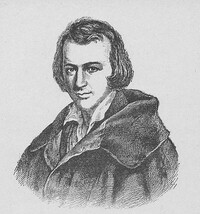- Person
- Male
- 13 December 1797
- Düsseldorf
- 17 February 1856
- Paris
- German
- Poet | Author | Journalist
-
- Q44403 ⟶ Heinrich Heine
-
- 34457918 ⟶ Heine, Heinrich
- Χάινε, Ερρίκος (1797-1856) [Άλλο όνομα] [Εναλλακτικό όνομα στα Ελληνικά] (Greek)
- central
Wikipedia Import
- Χάινριχ Χάινε (Greek) | Heinrich Heine (english)
- German poet, writer and literary critic (1797–1856) (english)
- Christian Johann Heinrich Heine (english) | Christian Heine (english) | Christian Johann Heinrich "Harry" Heine (english) | Heine (english)
- Χάινριχ Χάινε | Χάινριχ Χάινε | Heinrich Heine | Heinrich Heine
- 13-12-1797 | 01-01-1797
- 17-02-1856 | 01-01-1856



